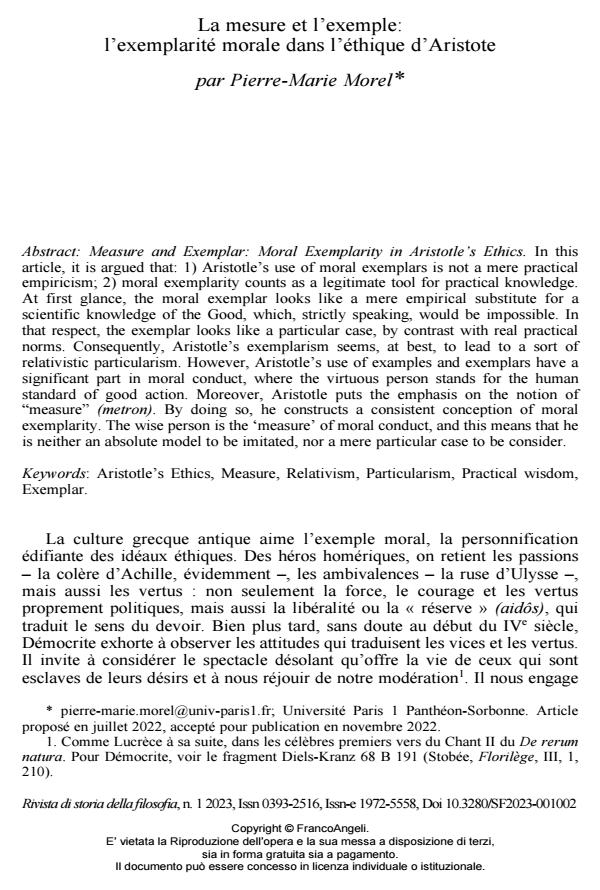Measure and Exemplar: Moral Exemplarity in Aristotle’s Ethics
Journal title RIVISTA DI STORIA DELLA FILOSOFIA
Author/s Pierre-Marie Morel
Publishing Year 2023 Issue 2023/1
Language French Pages 14 P. 11-24 File size 139 KB
DOI 10.3280/SF2023-001002
DOI is like a bar code for intellectual property: to have more infomation
click here
Below, you can see the article first page
If you want to buy this article in PDF format, you can do it, following the instructions to buy download credits

FrancoAngeli is member of Publishers International Linking Association, Inc (PILA), a not-for-profit association which run the CrossRef service enabling links to and from online scholarly content.
In this article, it is argued that: 1) Aristotle’s use of moral exemplars is not a mere practical empiricism;; 2) moral exemplarity counts as a legitimate tool for practical knowledge. At first glance, the moral exemplar looks like a mere empirical substitute for a scientific knowledge of the Good, which, strictly speaking, would be impossible. In that respect, the exemplar looks like a particular case, by contrast with real practical norms. Consequently, Aristotle’s exemplarism seems, at best, to lead to a sort of relativistic particularism. However, Aristotle’s use of examples and exemplars have a significant part in moral conduct, where the virtuous person stands for the human standard of good action. Moreover, Aristotle puts the emphasis on the notion of "measure" (metron). By doing so, he constructs a consistent conception of moral exemplarity. The wise person is the ‘measure’ of moral conduct, and this means that he is neither an absolute model to be imitated, nor a mere particular case to be consider.
Keywords: Aristotle’s Ethics, Measure, Relativism, Particularism, Practical wisdom, Exemplar.
- - Aubenque 1963: Pierre Aubenque, La Prudence chez Aristote, P.U.F., Paris 1963.
- - Dancy 2004: Jonathan Dancy, Ethics without Principles, Oxford University Press, Oxford 2004.
- - Frede 2020: Dorothea Frede, Aristoteles. Nikomachische Ethik, übersetzt, eingeleitet und kommentiert, Aristoteles Werke in deutscher Übersetzung, Band 6, De Gruyter, Berlin-Boston 2020.
- - Gauthier-Jolif 1970: René-Antoine Gauthier, Jean-Yves Jolif, Aristote. L’Éthique à Nicomaque, Intr., trad. et commentaire, Institut Supérieur de Philosophie, Louvain-la- Neuve 1970.
- - Giardina 2020: Giovanna R. Giardina (éd.), To Metron. Sur la notion de mesure dans la philosophie d’Aristote, Vrin-Ousia, Paris-Bruxelles 2020.
- - Morel 2020: Pierre-Marie Morel, Distinguer sans séparer. La définition aristotélicienne de la vertu éthique, « Revue de Philosophie Ancienne », 2020, 2, pp. 187-214.
- - Zagzebski 2017: Linda Trinkaus Zagzebski, Exemplarist Moral Theory, Oxford University Press, Oxford 2017.
- - Zingano 2013: Marco Zingano, Moral Particularism and Aristotelian Ethics, in Gabriela Rossi (éd.), Nature and the Best Life. Exploring the Natural Bases of Practical Normativity in Ancient Philosophy, Georg Olms Verlag, Hildesheim-Zürich- New York 2013, pp. 95-125.
- Introduction: Is Environmental Virtue Ethics a ‘Virtuous’ Anthropocentrism? Sylvie Pouteau, Gérald Hess, in Philosophies /2024 pp.172
DOI: 10.3390/philosophies9060172 - Exemplary Virtue: The Function of Exempla in Moral Instruction in the Middle Ages Ana Rieger Schmidt, in Topoi /2025 pp.971
DOI: 10.1007/s11245-025-10199-z
Pierre-Marie Morel, La mesure et l’exemple: l’exemplarité morale dans l’éthique d’Aristote in "RIVISTA DI STORIA DELLA FILOSOFIA" 1/2023, pp 11-24, DOI: 10.3280/SF2023-001002